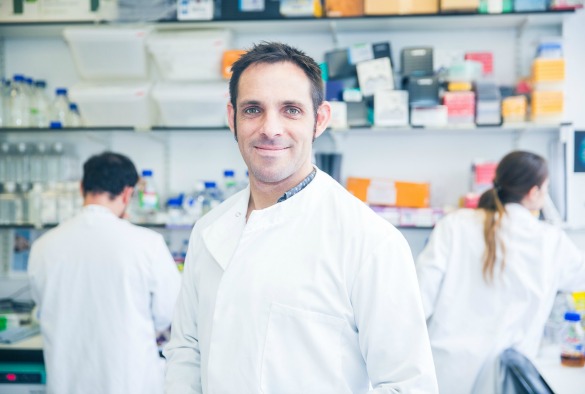A leading Liverpool scientist has been awarded a grant of over £190,000 by research charity Breast Cancer Now to investigate potential new treatments for a common type of breast cancer.
Around 20% of all breast cancers are ‘HER2-positive’, meaning they overproduce a protein called HER2 (human epidermal growth factor receptor 2). The HER2 protein helps cancer cells multiply and invade surrounding tissue, but it can be blocked by the drug Herceptin – the standard treatment for this type of cancer.
Unfortunately, over time, many HER2-positive breast tumours develop resistance to Herceptin which renders the drug ineffective, giving rise to the need for scientists to find alternative treatment options for patients.
More effective treatments
With new funding from Breast Cancer Now, Dr Mark Morgan – based at the University’s Institute of Translational Medicine – is to undertake a three-year project to investigate key molecules involved in the growth and invasion of HER2-positive breast cancer.
Dr Morgan aims to find out how these molecules communicate and work together to drive the disease, with the hope of uncovering novel therapeutic targets for patients whose cancer has become resistant to Herceptin.
Recent research funded by Breast Cancer Now has shown that in addition to HER2, another molecule called alpha-V beta-6 (αVβ6) also drives the invasion of breast cancer cells. Researchers have found that using a combination of drugs to block both HER2 and αVβ6 could slow down the growth of breast tumours even more than Herceptin alone. This could lead to more effective treatments for HER2-positive breast cancers, including those which have developed resistance to Herceptin.
Preventing drug resistance
Dr Morgan’s team now aims to shed light on the complex relationship between HER2 and αVβ6, uncovering exactly how they work together to drive cancer invasion and drug resistance. By understanding how, as well as where in cancer cells these molecules interact, it may be possible to target the processes that underpin cancer growth to improve current treatments, and even to prevent drug resistance arising.
Using cancer cells grown in the lab, Dr Morgan’s team is studying how HER2 and αVβ6 communicate with each other to encourage growth and invasion, as well as identifying other molecules involved in these processes.
They are also using sophisticated imaging techniques to pinpoint where in the cancer cells these interactions are taking place. Having identified these vital signals, they will transplant the cancer cells into zebrafish and analyse their invasion in real time when treated with different drugs targeting the key molecules.
Pioneering
Dr Mark Morgan, Principal Investigator in Cellular and Molecular Physiology at the University, said: “With this funding from Breast Cancer Now, we hope to identify molecules that work alongside HER2 to drive breast cancer growth and invasion. Our research could ultimately uncover novel drug targets that may hold the key to stopping HER2-positive breast cancer in its tracks.”
Dr Richard Berks, Senior Research Communications Officer at Breast Cancer Now, said: “Pioneering research like Dr Morgan’s will be crucial to helping tackle the enormous obstacle we’re facing in drug resistance.
“It is vital we understand how some patients’ breast cancers become resistant to treatments, and find ways to ensure they are not limited to a single line of defence. This research could lead to new alternatives for patients with HER2-positive breast tumours that have become resistant to Herceptin, and could ultimately save lives.
“Our ambition is that by 2050, everyone who develops breast cancer will live. Dr Morgan’s project could help bring us one step closer to this goal and we’d like to thank our supporters across the region who continue to help make our life-saving research possible.”
